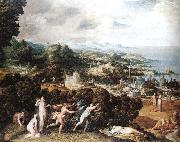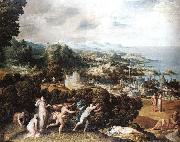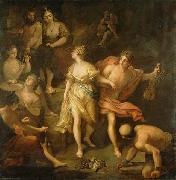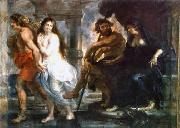Wholesale Oil Painting No Minimum |
|||||||||||
|
|
|||||||||||

|
|||||||||||
|
|
|
||||||||
ABBATE, Niccolo dellItalian Mannerist Painter, ca.1512-1571 Italian painter. He was trained in Modena and developed his mature style under the influence of his contemporaries Correggio and Parmigianino in Bologna (1544 ?C 52). There he painted portraits and decorated palaces with frescoes of landscapes and figure compositions in the Mannerist style. In 1552 he was invited by Henry II of France to work under Primaticcio at the Palace of Fontainebleau, where he executed immense murals (most now lost). He remained in France the rest of his life. His mythological landscapes were a principal source of the French Classical landscape tradition, and he was a precursor of Claude Lorrain and Nicolas Poussin. |
||||||||
|
|
||||||||
Orpheus and Eurydice
Orpheus and Eurydice Painting ID:: 4635 |
Oil on canvas, 188 x 237 cm
National Gallery, London Oil on canvas, 188 x 237 cm National Gallery, London |
|||||||
|
|
||||||||
|
|
||||||||
|
|
Orpheus and Eurydice
Orpheus and Eurydice Painting ID:: 78008 |
Date 1st half of 16th century
Medium Oil on canvas
Dimensions Width: 237 cm (93.3 in). Height: 188 cm (74 in).
cyf Date 1st half of 16th century Medium Oil on canvas Dimensions Width: 237 cm (93.3 in). Height: 188 cm (74 in). cyf |
||||||
|
|
||||||||
Jean RaouxFrench Painter, 1677-1734, French painter. He trained first in Montpellier with Antoine Ranc (1634-1716), in whose studio he completed his early painting Ariadne on Naxos (1701; Montpellier, Mus. Fabre). He subsequently moved to the Paris studio of Bon Boullogne and in 1704 won the Prix de Rome with David Slaying Goliath (untraced). He completed his education at the Acad?mie de France in Rome and also spent time in Florence and Padua. For the Cathedral at Padua he executed an Annunciation and a Visitation (both in situ). In 1707-9 Raoux was in Venice, where he made contact with his future patron Philippe de Vendeme (1665-1727), Grand Prior of the Order of the Knights of Malta. From 1714 he lodged in the Grand Prior's Paris residence, the Temple, a privilege that was renewed in 1719 by Vendeme's successor Jean-Philippe, |
||||||||
|
|
||||||||
|
|
Orpheus and Eurydice
Orpheus and Eurydice Painting ID:: 88080 |
Oil on canvas, c. 1718-1720
cjr Oil on canvas, c. 1718-1720 cjr |
||||||
|
|
||||||||
Peter Paul RubensFlemish Baroque Era Painter, 1577-1640 Peter Paul Rubens (June 28, 1577 ?C May 30, 1640) was a prolific seventeenth-century Flemish Baroque painter, and a proponent of an exuberant Baroque style that emphasized movement, color, and sensuality. He is well-known for his Counter-Reformation altarpieces, portraits, landscapes, and history paintings of mythological and allegorical subjects. In addition to running a large studio in Antwerp which produced paintings popular with nobility and art collectors throughout Europe, Rubens was a classically-educated humanist scholar, art collector, and diplomat who was knighted by both Philip IV, king of Spain, and Charles I, king of England. Rubens was a prolific artist. His commissioned works were mostly religious subjects, "history" paintings, which included mythological subjects, and hunt scenes. He painted portraits, especially of friends, and self-portraits, and in later life painted several landscapes. Rubens designed tapestries and prints, as well as his own house. He also oversaw the ephemeral decorations of the Joyous Entry into Antwerp by the Cardinal-Infante Ferdinand in 1635. His drawings are mostly extremely forceful but not detailed; he also made great use of oil sketches as preparatory studies. He was one of the last major artists to make consistent use of wooden panels as a support medium, even for very large works, but he used canvas as well, especially when the work needed to be sent a long distance. For altarpieces he sometimes painted on slate to reduce reflection problems. His fondness of painting full-figured women gave rise to the terms 'Rubensian' or 'Rubenesque' for plus-sized women. The term 'Rubensiaans' is also commonly used in Dutch to denote such women. |
||||||||
|
|
||||||||
|
|
Orpheus and Eurydice
Orpheus and Eurydice Painting ID:: 97117 |
1636-1638
Medium oil on canvas
Dimensions 194 X 245 cm
cyf 1636-1638 Medium oil on canvas Dimensions 194 X 245 cm cyf |
||||||
|
|
||||||||
|
Peter Paul Rubens Flemish Baroque Era Painter, 1577-1640 Peter Paul Rubens (June 28, 1577 ?C May 30, 1640) was a prolific seventeenth-century Flemish Baroque painter, and a proponent of an exuberant Baroque style that emphasized movement, color, and sensuality. He is well-known for his Counter-Reformation altarpieces, portraits, landscapes, and history paintings of mythological and allegorical subjects. In addition to running a large studio in Antwerp which produced paintings popular with nobility and art collectors throughout Europe, Rubens was a classically-educated humanist scholar, art collector, and diplomat who was knighted by both Philip IV, king of Spain, and Charles I, king of England. Rubens was a prolific artist. His commissioned works were mostly religious subjects, "history" paintings, which included mythological subjects, and hunt scenes. He painted portraits, especially of friends, and self-portraits, and in later life painted several landscapes. Rubens designed tapestries and prints, as well as his own house. He also oversaw the ephemeral decorations of the Joyous Entry into Antwerp by the Cardinal-Infante Ferdinand in 1635. His drawings are mostly extremely forceful but not detailed; he also made great use of oil sketches as preparatory studies. He was one of the last major artists to make consistent use of wooden panels as a support medium, even for very large works, but he used canvas as well, especially when the work needed to be sent a long distance. For altarpieces he sometimes painted on slate to reduce reflection problems. His fondness of painting full-figured women gave rise to the terms 'Rubensian' or 'Rubenesque' for plus-sized women. The term 'Rubensiaans' is also commonly used in Dutch to denote such women. Orpheus and Eurydice 1636-1638 Medium oil on canvas Dimensions 194 X 245 cm cyf |
||||||||
|
|
||||||||
|
Prev Next
|
||||||||
|
|
||||||||
|
Related Paintings to Peter Paul Rubens :. |
||||||||
|
|
||||||||
|
CONTACT US |




